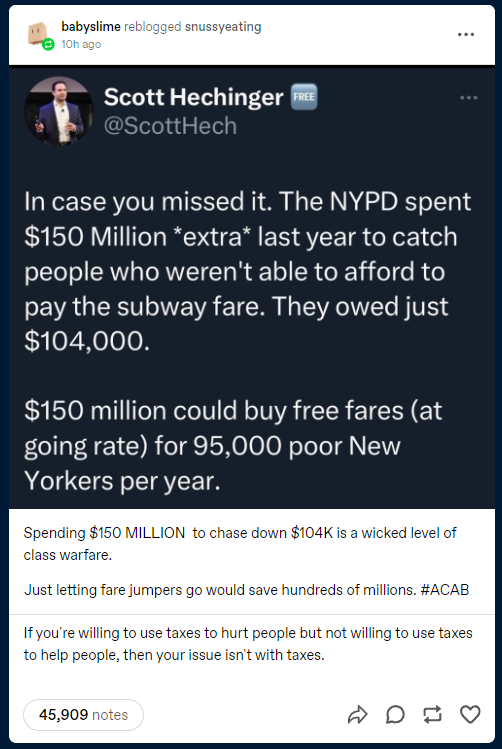this post was submitted on 14 Feb 2024
1577 points (97.1% liked)
tumblr
3411 readers
642 users here now
Welcome to /c/tumblr, a place for all your tumblr screenshots and news.
Our Rules:
-
Keep it civil. We're all people here. Be respectful to one another.
-
No sexism, racism, homophobia, transphobia or any other flavor of bigotry. I should not need to explain this one.
-
Must be tumblr related. This one is kind of a given.
-
Try not to repost anything posted within the past month. Beyond that, go for it. Not everyone is on every site all the time.
-
No unnecessary negativity. Just because you don't like a thing doesn't mean that you need to spend the entire comment section complaining about said thing. Just downvote and move on.
Sister Communities:
-
/c/TenForward@lemmy.world - Star Trek chat, memes and shitposts
-
/c/Memes@lemmy.world - General memes
founded 1 year ago
MODERATORS
you are viewing a single comment's thread
view the rest of the comments
view the rest of the comments

I took economics in my college days and this is a very stark example of people who are bad at economics.
Everything costs money. You can relate everything to a dollar amount in business. From labor, to time spent, to equipment and it's use, the cost of fuel for transportation etc. Knowing the full cost of selling an item including the time spent making it, the supplies used, the failure rate where you need to replace it at no cost to the customer, everything should be able to be factored in. From there you can set the cost of something, taking the overall price for all involved aspects of creating the thing, and adding some profit margin.
Spending a dollar to make a dime is adequate. If your economic costs are a dollar and you sell the thing for $1.10 then you make money. Sell enough and that's business.
With all that being said, the cost of transit fares should be set with the expectation that there will be unavoidable times where people will ride for free. Whether that's because of gate jumping, or other fare avoidance, or that someone simply entered into the system in an unexpected way that bypassed the fare system, or if it's simply that a fare was given out as courtesy, it's all baked into the fares that everyone pays.
The only time chasing down the people intentionally skipping their fare, makes any sense is if that amount of loss because of fare skipping is significantly above the expected losses from fare skipping. Googling it, the NYC transit system has a gross revenue around 5.8 billion dollars. Which means the amount of revenue to be gained by chasing down ~$100k in losses is around 0.0017%
If, the process of chasing down the fares costs over 1000% more than the fares are worth to do it, then the simple answer is: don't do it. That's basic economics.
In addition, they garner so much negative publicity in that process that they damage their reputation needlessly, which may lead to additional spending to improve their public image.
Finally, if you don't have more than 0.002% of your earnings set aside for losses like this, then you shouldn't be running the business. In reality, that number should be much, much higher than 0.002%.
To conclude: the whole thing is stupid from the outset. Tracking the losses makes sense, so you know what the figures are. Once you know the figures, crunching the numbers to see if pursuing action against the perpetrators is trivial, and should show a very clear picture of whether to take action or not.
In this case, no action was appropriate. Instead, they spent $150 million to get their public image ruined chasing after a bit more than $100k, and they will likely spend $100M more to try to repair their public image.
The losers in this situation? The people.
They're not bad at economics, they're simply lying about what their goal was. That $150mil didn't just blip out of existence like in a video game, it ended up in people's pockets.
I would bet good money that many of those pockets belonged to friends and family members. Neoliberals have been using this tactic for decades as a way to turn public funds into private profits.
Or it just went into overtime for enforcers to sit around a train station watching a monitor.
"Sleeping Car: Abyss Presence"